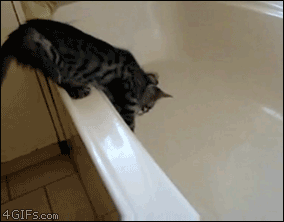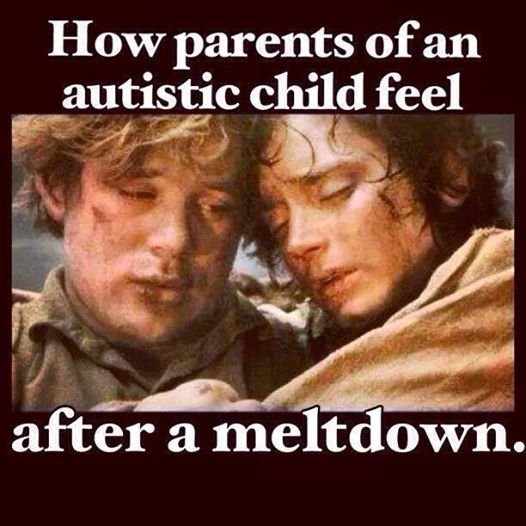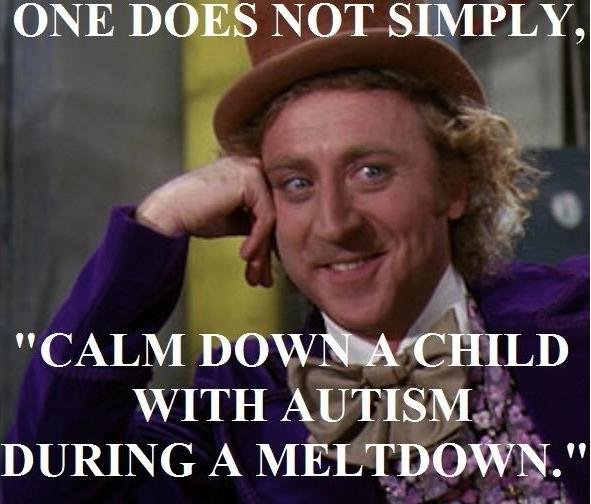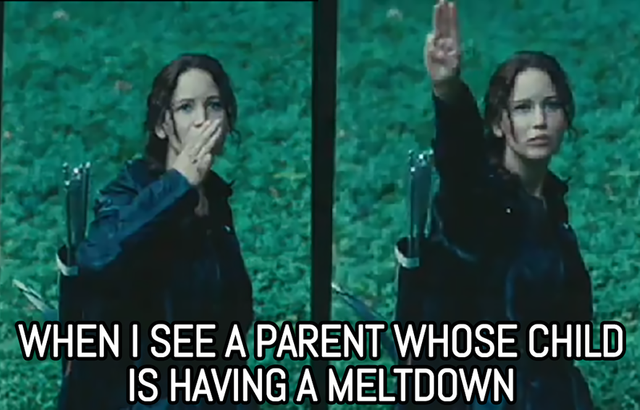What it means to have an Autistic Meltdown - from a mum's perspective
I plan on writing about my experiences with Autism here on steemit and I believe it is important for people to understand some key terminology I will be using like in my post on what it means to be Non Verbal Autistic. In this post I want to focus on meltdowns.
As a mother of two severely autistic non verbal children - who have their own individual and sometimes extreme types of meltdowns and triggers, I have experienced more than my fair share of meltdowns. I hope to give you a unique perspective, on what it is like to have a meltdown and what it's like to be on the receiving end of one.

Meltdown or Tantrum?
There are two main differences between a child having a meltdown and a child throwing a tantrum.
- When an autistic child is having a meltdown, they are not In Control of their body, actions and this often happens when they are not in control of their environment.
- A tantrum is a technique a child may use to protest a situation or show their displeasure and even manipulate to achieve their goal whatever that may be.
- Meltdowns will happen regardless as they are a response to stimulus overload and can happen even when the child is alone.
- Whilst tantrums always require an audience, they usually stop when ignored or a distraction is offered.
What can Trigger/Cause a Meltdown?
There are numerous things that can cause a meltdown, here are a few we encounter most often with our children.
Auditory Overload this can be as simple as the hum of electronic appliances, or it could be the loud sounds of shopping centre and it can even be the sound of a plane flying overhead any sound can be a trigger in the right situation
Tactile Overload this was a major issue for my son only recently has he become able to tolerate the touch of water he was hydrophobic and he also couldn't stand contact with sand otherwise he would become distraught. We had to sponge bathe him for three years and using a dry shampoo. When we attempted to put him in the bath he would prop his feet on the edges of the tub trash, scream, claw and cry - he was petrified he only lashed out in fear of the situation he was forced into (it took three years of intensive therapy to get him over his starting with being able to stick a finger in a drop and working our way up - he is now taking swimming lessons at his special school).

Visual Overload things like the constant flicker of fluorescent lights to the fireworks on New Year's Eve. Crowds of people, consider what this is like when you're only a small child around large adults. Sometimes even just a specific colour or pattern can be enough to trigger a meltdown.
Information Overload talking at a child with autism, giving them instructions and using too many words for them to process can cause an information overload. There is simply too much data for them to be able to process and this again can result in a meltdown, especially if you use long and complex sentences.
Many children with autism experience the auditory world through a sort of time delay - they can hear you in real time - but need time to process what you've said to them, with my daughter it's around 60 seconds and my son can be longer at closer to 1 min 30 seconds.
Emotional Overload something as simple as changing a well established routine can result in a meltdown because of an emotional overload, the unpredictable nature of life can be extremely overwhelming for a child with autism.
Routines are established and used as a tool to assist children with autism, so that they can learn how to function in daily life the general unpredictability of life is simply too much - structure is given so they can know what to expect and not be overwhelmed. This being changed suddenly can result in massive meltdowns.
What happens in a Meltdown?
Not all meltdowns look alike, my son is prone to meltdowns - from about the age of one he started having extreme meltdowns over many different things. His reactions were and still are very difficult to handle.
Meltdowns can cause violent outbursts, my son tends to direct his violence towards those around him preferably me (he has been known to seek me out to head butt my shins, run into me and bite me) but if I'm not there usually his teachers or classmates. He has different actions depending on what has upset him, he will bite people who invade his space during a meltdown but he will also seek out things to bite to get sensory feedback (self regulating).

I have probably been bitten by him the most with my partner @ausbitbank and our daughter coming in close behind. He has drawn blood and done some serious damage, the worst to date was recently when he bit his sister's nose as she leaned in to kiss him - she was unable to read the signs that he was not able to cope with the proximity she was forcing on him - he lashed out defensively as he was overwhelmed and it resulted in him melting down and she had cuts from his teeth on both side of her nose.
There is often lots of crying and screaming, this is why meltdowns are often confused for tantrums. My daughter will throw things when she is having a meltdown, anything from small toys to large pieces of furniture - I have seen her throw chairs and small bookshelves, she will try larger furniture but even with her insane strength she can only smash it into the walls to slide it along the floor (rather than flip which seems to be her desire).
My daughter will throw herself on the ground with no regard to the surface concrete, tiles and bitumen she will jump and lift her legs up and fall full force onto her knees, she will hit herself, bite herself kick and throw her arms around with no regards to her surroundings she would often hurt herself if we did not intervene.
How to help someone having a Meltdown?
My daughter responds well to deep pressure and proprioceptive feedback, so when she is having a dangerous meltdown we have to intervene. This usually results in me restraining her arms and legs whilst sitting on my lap, I curl her legs up so she can push against me giving her the proprioceptive feedback she is seeking. I cuddle the top half firmly so she can move but I stop her from hitting herself - though I can't always stop her from hitting me.
My son will bite himself or anyone near him, he drops but will jumps back up into you as you try to aid him. If you pick him up he will thrash, kicking, hitting and biting. If he is alone he likes to use toys as hammers using them to smash into tables and walls, he will lay down and kick walls whilst violently biting toy's, pillows, shoes anything.

The thing is every meltdown is different, I have been seriously hurt by my children - i've had black eyes, blood nose, busted lips, too many bruises to count and so many bites they begin to blur together.
I need to point out a very crucial point here - I love my children and they love me - when my children are having a meltdown they are Not in Control they are not trying to hurt themselves or anyone else. They are simply trying to regain some control when they have lost all control.
A perfect example is with my son, I recently went to pick him up from school and he was midway through a meltdown - I came in and tried everything I could to help him calm down - in the end all I could do was sit nearby and watch. He lay on some cushions thrashing away kicking and biting a small toy when he finally managed to self regulated and calm down on his own - he sat up smiled at me and acted as though he had no idea I had been there the whole time. He has to be aloud to self regulate and calm himself down he does not respond well to interfering and we only do so when he is self harming or harming others.

Meltdowns are hard to deal with for all involved, they happen at the worst of times in the worst of places. However it is important to realise these children are not in control of what they are doing, they are reacting to the situation they find themselves in.
The next time you see a mother struggling with her young child at the shops, do take what you see to immediately mean lack of discipline. This mother may just be trying to help her child cope with a situation beyond either of their control.

Take a moment here you have two decent choices - give her a smile and a nod of encouragement from a distance let her know you understand and you're not inconvenienced by their turmoil or you take a leap faith walk over and offer her a hand, she might be struggling with a trolley or shopping bags and sometimes just having someone stand next to you and face the stares and comments with you is help enough.
In my opinion you either do that or do nothing simply walk on and ignore the situation. Don't be too quick to judge!
Like what you've read so far? Subscribe here.
Learn about the author - Read my introduction post!
Great article.
Thank you for sharing your experiences and insights.
No worries at all, my hope is that I can help raise some awareness of common issues and behaviours and that people might learn how to interact with a person who is not coping and offer some help. Knowing what to do is the hard part, acting is the easy part.
Yes yes yes. This is such a helpful breakdown of what is happening.
Thanks @shawnamawna I have found my best defense in these situations is knowledge and understanding of what is actually going on, instead of just assuming it's a tantrum because of what it looks like.
I don't have children.. I never will hopefully.. the antichrist is coming in the next 20 years.. But I really love your posts and will continue upvoting them.. Keep hanging out in Stakepool!